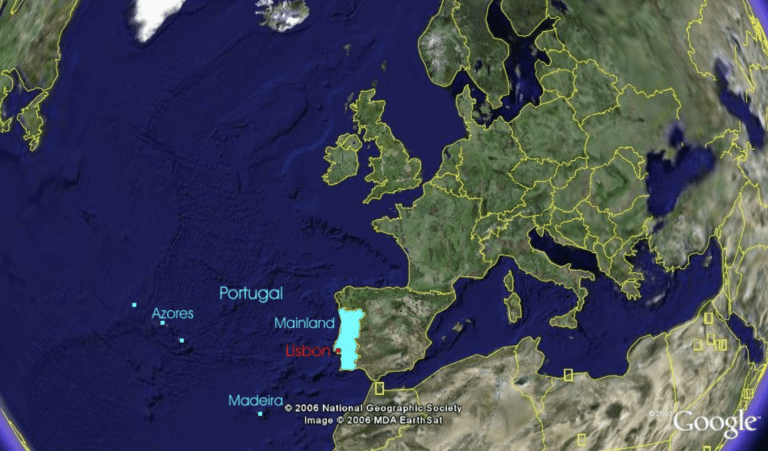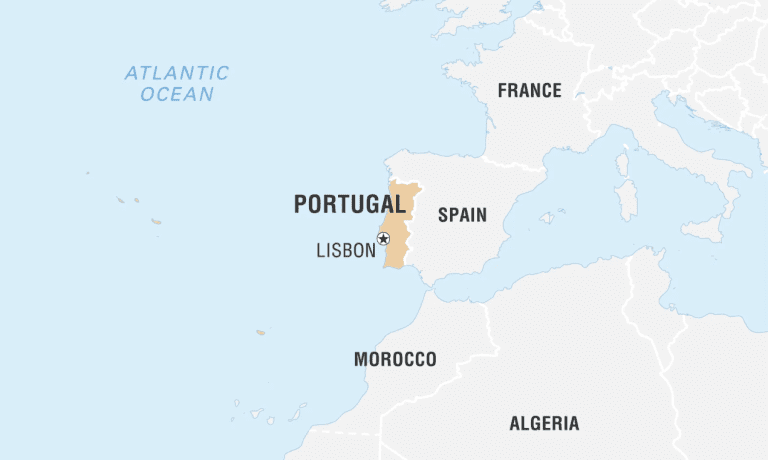When planning a trip to Portugal, one may wonder if it is safe to drink the tap water there. This blog post will provide insight into the safety and quality of tap water in Portugal, including Lisbon, Porto, and Algarve; examining government monitoring efforts to ensure international standards are met as well as taste variations between bottled and tap water.
We’ll discuss the monitoring and testing conducted by the Portuguese government to ensure that local tap water meets international water quality standards. Furthermore, we will delve into taste differences between tap and bottled water due to factors such as groundwater contamination concerns and chlorination processes.
In addition to these topics, our discussion on whether or not you can drink tap water in Portugal will cover investing in high-quality filtration systems like reverse osmosis filters for ensuring clean and healthy drinking water during your stay. We’ll also touch upon reducing plastic waste while traveling abroad by opting for reusable stainless steel bottles over disposable containers.
Lastly, we’ll provide information about public taps found throughout cities and towns across Portugal which offer access to clean drinking water while encouraging eco-conscious choices. Additionally, we’ll shed light on asking for tap water at restaurants with respect to legal requirements for using glass bottles instead of plastic ones – promoting environmentally responsible practices among tourists visiting this beautiful country.
Tap Water Safety in Portugal
Portugal’s tap water meets or exceeds international safety standards, with 98.7% of public water reported as safe in 2015.
Lisbon, Porto, and Algarve have drinkable tap water under strict regulations
Major cities and tourist destinations like Lisbon, Porto, and the Algarve region have high-quality tap water subject to strict regulations.
The Portuguese Ministry of Environment and Regional Development works to establish water quality policies and improve infrastructure, including treating surface water sources more effectively.
Rapid improvement due to directives from Brussels
Portugal has made rapid advancements in water infrastructure since joining the EU and adhering to directives issued from Brussels.
Strict regulations enforced by national organizations
The Portuguese government sets strict thresholds for monitoring and testing tap water quality, with organizations like Water Institute INAG ensuring compliance.
If you prefer bottled water or have a sensitive palate, consider investing in a high-quality water filter during your visit to Portugal to improve taste and reduce plastic waste generation.
Portuguese Tap Water: Safe and High-Quality
Portugal takes tap water safety seriously, with strict regulations and ongoing monitoring to ensure high-quality drinking water.
Improvements Driven by EU Directives
Portugal’s tap water has rapidly improved thanks to EU regulations and investments in water infrastructure and treatment.
Strict Regulations and Ongoing Monitoring
- Water Infrastructure: Upgrades to pipes and treatment plants ensure clean, safe tap water.
- Treating Groundwater Sources: Proper treatment reduces potential health risks from groundwater contamination.
- Ongoing Monitoring & Testing: Regular checks guarantee consistent high-quality tap water throughout Portugal.
Urban centres such as Lisbon, Porto and Algarve boast some of the finest potable water in Europe, with the Portuguese Ministry of Environment and Regional Development ensuring it is kept safe by enacting various protective measures.
So skip the bottled water and drink tap water in Portugal – it’s safe, high-quality, and better for the environment.
Taste Differences Between Bottled and Tap Water
Although tap water in Portugal meets international water quality standards, many prefer bottled water due to taste differences.
Groundwater Contamination Affecting Taste
Portugal relies heavily on groundwater sources, which can be contaminated by human activities like agriculture and industry, altering the taste of local tap water.
Chlorination Treatment Process Causing Unpleasant Aftertaste
Chlorine used during treatment processes can leave an unpleasant aftertaste or smell in tap water, even detectable during cooking preparations.
One solution to address these taste differences is using a high-quality water filter like activated carbon or reverse osmosis systems, which can effectively remove contaminants and chlorine residues, improving the overall taste of your drinking water without resorting to single-use plastic bottles.
By investing in a reusable bottle and filtering your tap water at home or on-the-go, you’ll not only enjoy better-tasting H2O but also contribute positively towards reducing global pollution levels caused primarily through excessive consumption patterns associated with disposable containers alike.
Invest in High-Quality Filtration Systems for Safe and Tasty Drinking Water
When in Portugal, tap water is safe to drink, however if you would like a different taste or want extra assurance of purity then investing in an advanced filtration system can be beneficial.
Reverse Osmosis Filters: The Best Way to Purify Tap Water
Reverse osmosis filters are the most effective way to purify tap water while preserving its desirable flavor profile.
Enhanced Protection Against Contaminants
Advanced filtration methods like reverse osmosis offer increased safety measures by removing harmful substances from incoming water streams before consumption occurs.
- Eco-friendly: Using a high-quality water filter reduces the need for single-use plastic bottles, contributing to a more sustainable lifestyle.
- Cost-effective: Investing in a filtration system can save you money in the long run by eliminating the need to purchase bottled water regularly.
- Convenient: With an efficient filtration system installed, you’ll have access to clean and great-tasting drinking water anytime you want without relying on store-bought options.
Overall, investing in a high-quality reverse osmosis filter is a smart choice for anyone looking to improve their tap water’s taste and safety, whether at home or while traveling in Portugal.
Environmental Impact of Plastic-Bottled Beverages Consumption
Despite Portugal being one of Europe’s top consumers of plastic-bottled beverages, recycling rates remain alarmingly low.
Opting for reusable stainless steel bottles is a cost-effective and eco-friendly alternative to reduce environmental impact while traveling.
Low Recycling Rates in Portugal
Portugal’s recycling rate is only around 30%, lagging behind many European countries.
The excessive use and disposal of plastic bottles contribute significantly to pollution and environmental degradation.
Reusable Stainless Steel Bottles as an Eco-Friendly Alternative
Reusable stainless steel bottles are a durable, BPA-free, taste-neutral, and temperature-controlled option over time.
By choosing tap water whenever possible, you’ll be making a conscious effort towards promoting sustainability and reducing plastic waste generation within local communities alike.
Portugal’s tap water meets international quality standards and is safe for consumption.
Next time you visit Portugal, pack a reusable stainless steel bottle and enjoy the refreshing taste of local tap water while doing your part in preserving our environment.
Initiatives to Combat Excessive Use of Disposable Containers
Various initiatives in Portugal are aimed at combating excessive use of disposable containers, especially for potable liquids like water.
Public Taps Providing Accessible Drinking Water
Public taps can be found in popular tourist destinations like Lisbon, Porto, and Algarve, offering clean tap water that meets international water quality standards.
Encouraging the Use of Reusable Containers
- Eco-friendly campaigns: Non-profit organizations in Portugal promote eco-conscious practices through informative campaigns designed to reduce plastic waste generation via reusable container usage.
- Glass bottles in restaurants: Portuguese restaurants serve bottled water in glass bottles rather than plastic ones, promoting sustainable practices and encouraging patrons to request tap water.
- Sustainable tourism initiatives: Many sustainable tourism initiatives in Portugal encourage visitors to adopt eco-friendly habits, such as using reusable water bottles and avoiding single-use plastics.
By making small yet impactful changes, both locals and tourists can help combat excessive use of disposable containers while promoting sustainable practices throughout Portugal.
Requesting Tap Water at Restaurants in Portugal
Don’t be afraid to ask for tap water served in a jar when dining out in Portugal – it’s an eco-conscious choice that won’t inconvenience anyone, and establishments are required by law to use glass bottles anyway.
Legal Requirements on Using Glass Bottles in Restaurants
Portuguese law mandates that all restaurants must serve water in glass bottles, so ordering tap water helps support establishments’ compliance with these regulations while reducing plastic waste.
Drinking tap water is generally safe as it meets or exceeds international water quality standards set forth by organizations like the European Union (EU).
Eco-Conscious Choices During Dining Experiences
- Ordering Tap Water: Opt for local tap water, which has been treated and tested according to strict guidelines established by authorities such as the Portuguese Ministry of Environment and Regional Development.
- B.Y.O.B (Bring Your Own Bottle): Bring a reusable stainless steel bottle to cut down on plastic waste and ensure access to high-quality filtered water.
- Supporting Sustainable Initiatives: Look for local initiatives that promote eco-friendly practices, such as restaurants offering discounts to customers who bring their own containers or establishments using time water filters and glass bottles instead of disposable plastic options.
Incorporating these simple habits into your dining experiences while visiting Portugal can have a significant impact on reducing the environmental footprint of your trip.
FAQs in Relation to Can You Drink Tap Water in Portugal
Is it Safe to Drink Tap Water in Portugal?
Yes, tap water in Portugal is safe to drink as it meets high-quality standards set by EPAL and the European Union.
What is the Quality of Portugal’s Tap Water?
Portugal’s tap water undergoes regular testing to ensure it remains free of harmful substances like bacteria or heavy metals.
Can You Drink Lisbon’s Tap Water?
Yes, Lisbon’s tap water is safe to drink, but its taste may vary due to chlorination or local mineral content.
What About Reddit Discussions on Drinking Tap Water in Portugal?
- Reddit thread discussing drinking Portuguese tap water
- Another Reddit discussion about Lisbon’s drinking-water safety
Conclusion
Is tap water safe to drink in Portugal?
In short, tap water in Lisbon, Porto, and Algarve is safe to drink and regularly monitored by the Portuguese government, but taste differences may exist due to groundwater contamination concerns and chlorination processes.
Investing in high-quality filtration systems like reverse osmosis filters can ensure clean and healthy drinking water while reducing plastic waste when traveling abroad.
Public taps are also available throughout Portugal for access to clean drinking water while promoting eco-conscious choices.
When dining out, it’s legal to ask for tap water served in glass bottles as a way of promoting environmentally responsible practices.
